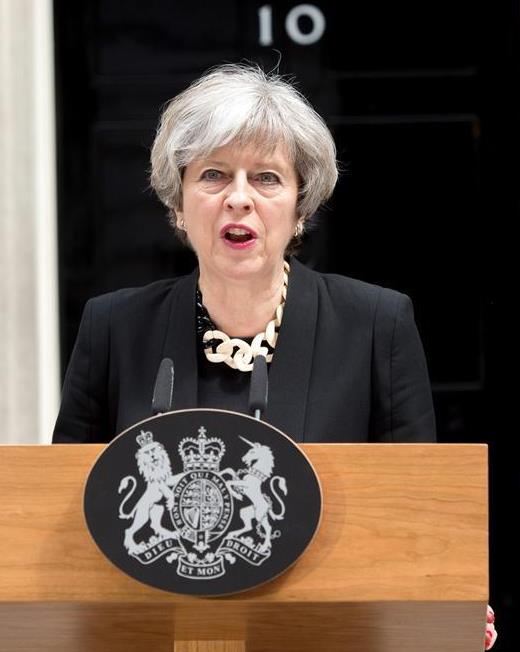British election: Will Corbyn steal the show?
- By Heiko Khoo
 0 Comment(s)
0 Comment(s) Print
Print E-mail China.org.cn, June 6, 2017
E-mail China.org.cn, June 6, 2017
|
|
|
British Prime Minister Theresa May delivers a speech in response to the terror attacks on London Bridge and at Borough Market in London, Britain on June 4, 2017. May said the election will go ahead as planned on Thursday. [Photo/Xinhua] |
Faced with an apparently insurmountable challenge, Jeremy Corbyn's Labour Party has come out fighting and if opinion polls are to be believed, Corbyn has dramatically improved Labour's prospects over the last few weeks.
He used the opportunity presented by the election to stamp his mark through the release of the most radical Labour Party election manifesto since 1945. The manifesto proposes to take the railways, the Royal Mail, water and part of the energy industry into public ownership.
In addition, a national investment bank will be established to finance a sweeping program of public investment to reinvigorate Britain's infrastructure. Labour also intends to build 100,000 council homes a year and to guide private sector investment in housing at the same scale, so that 1 million new homes would be built within five years. Labour's commitment to abolishing tuition fees has proven enormously popular among the youth, and there was a huge surge of voter registration among under 25-year-olds.
Corbyn promises to establish a National Education Service offering free education for all at the point of use. This concept emulates the National Health Service established by the 1945 Labour government, which is universally regarded as the greatest achievement of any Labour government in British history.
It is envisaged that the National Education Service will dramatically improve the technical, scientific and cultural knowledge of the people, which will upgrade the skills and productivity of the workforce. The manifesto also promises a £10 an hour living wage, four new statutory "bank" holidays, improved rights at work and a range of other progressive measures to improve the lives of the majority.
It is expected that improved tax collection measures and higher taxes for the wealthiest 5 percent and for large corporations will be able to generate the necessary resources to fund these policies.
Early in the campaign, opinion polls put the Tories as much as 22 percent ahead of Labour but in recent days their lead has narrowed to just 5 or 6 percent. The release of Labour's manifesto signaled the start of a dramatic turnaround in the party's electoral prospects. When people were asked if they support Labour's manifesto policies, large majorities agreed.
Age and sex have become the most accurate determinant of predicted voting patterns, with women and those under 49-years of age more likely to vote Labour. And, among under 25-year-olds, a whopping 69 percent want Corbyn as Prime Minister. A large-scale survey conducted in marginal seats over the last few days, now points to a hung parliament with the Tories losing seats to Labour. This huge shift in public opinion in a matter of weeks is almost entirely due to Corbyn's dogged determination and his campaigning abilities.
An international trend to breach the dam of traditional political structures has been seen with Bernie Sanders and Donald Trump in the United States, with Le Pen, Melechon and Macron in France, with Syriza in Greece, with Podemos in Spain, with the Brexit vote, and with Jeremy Corbyn's election as Labour leader in Britain.
However, rather than indicating a dissolution of politics based on social class as most analysts in the mainstream media suggest, all of these cases, which have shaken up the political mainstream, are best understood as expressions of the re-emergence of class at the center of politics.
The working class in Western capitalist countries is normally represented by social democratic parties, which seek to maintain the status quo in the ownership and control of wealth in society, while offering minor concessions to the workers. When the long period of apparent consensus between the classes came to an abrupt halt in 2008, the mainstream political parties sided with the wealthy and powerful to protect their interests. The feeling grew that the majority lack any genuine political representation.
Only a month ago, Corbyn's leadership of the Labour Party was almost universally condemned in the media and by most of his own members of Parliament. The party members who elected him as their leader two years in a row were said to be unrepresentative of the attitudes of past and future Labour voters. According to this theory, the Labour Party vote consists of a combination of "the traditional working class" and sections of the liberal minded middle-class.
A division between these two groupings was clearly evident in those Labour heartlands, particularly in the north of England, which voted to leave the EU. In addition, the liberal minded middle class were supposed to be disgusted at Corbyn's "lacklustre" defence of the EU.
Incessant attacks on the person of Jeremy Corbyn have been designed to turn Labour voters against him. However, these attacks did the opposite, they galvanized his supporters more strongly behind him. During this election campaign, the public became more familiar with his policies and his personal qualities. One chance event revealed the mood among the youth. At a football stadium where a rock concert was taking place, Corbyn was invited to address the 20,000 strong crowd.
He was received with rapturous applause and chants of "ohhh Jeremy Corbyn, ohhh Jeremy Corbyn", which drowned out parts of his short but enthusiastic address. If the polls are right, and Corbyn's Labour Party prevents a Tory landslide, this will confound the political and economic establishment. However, if the momentum towards Labour escalates over the next week, Corbyn may yet pull off an extraordinary victory.
Heiko Khoo is a columnist with China.org.cn. For more information please visit: http://www.china.org.cn/opinion/heikokhoo.htm
Opinion articles reflect the views of their authors, not necessarily those of China.org.cn







Go to Forum >>0 Comment(s)